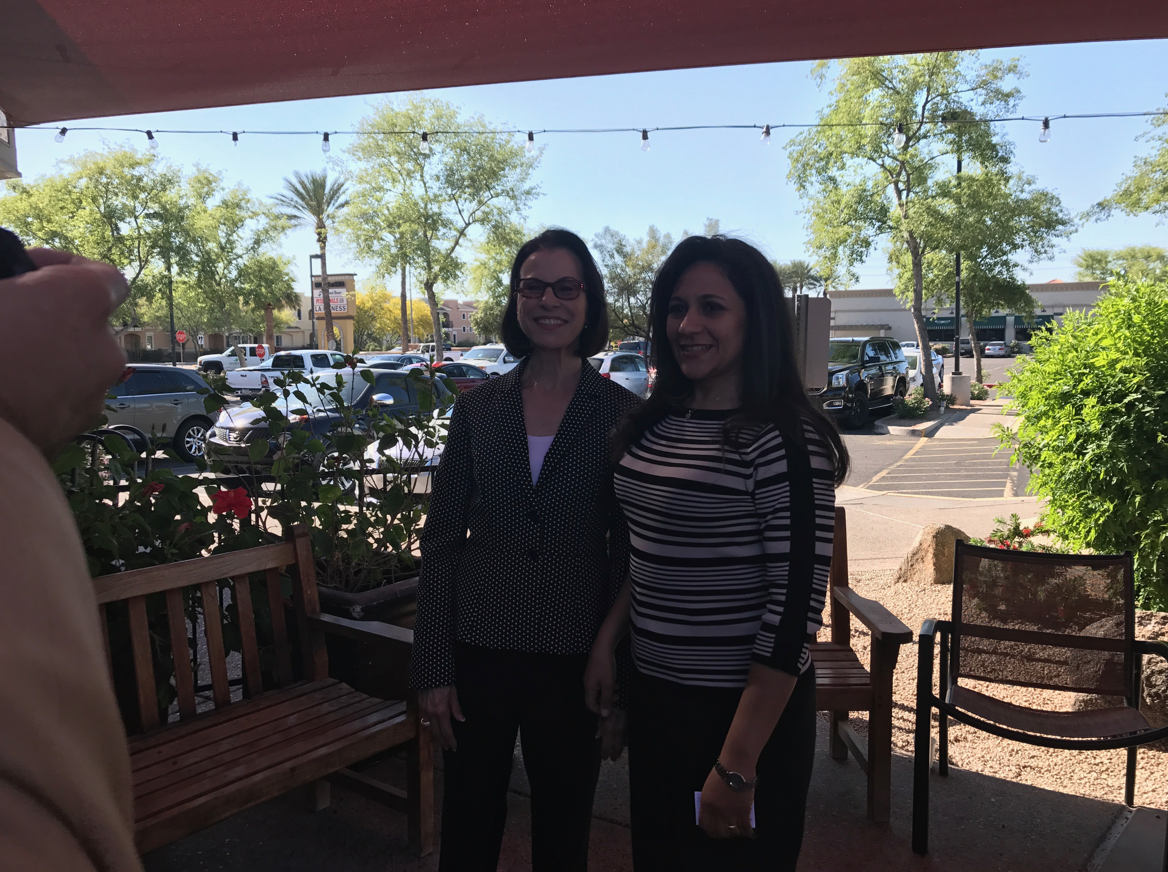Global Ties Arizona promotes relationship between journos
Reporting and perceptions contained therein were discussed at a panel event in Scottsdale
Ivana Venema-Nunez/Northeast Valley News
Suzanne Klapp (left) with Heba M. Basha (right).
April 29, 2017
Global Ties Arizona is an organization that hosts events on behalf of the United States Department of State’s International Visitor Leadership Program, and it invites individuals from across the globe to discuss various topics. In this particular event, the topic was focused on Middle Eastern journalists and their perception on the United States. The invitees expressed their concern for the lack of knowledge Americans have as citizens towards their culture.
“In this case these are all journalists, so to talk to people in the United States about journalism here in comparison to journalism in their country,” Scottsdale Vice Mayor Suzanne Klapp said. “So it’s a great opportunity to exchange ideas about journalism, freedom of the press, the right of people to know what’s happening in their countries.”
Scottsdale is always going to be involved in every event Global Ties has, as the Vice Mayor explained in her introduction. Guests in this event came from Egypt, Iraq, Saudi Arabia and from local news in Scottsdale. This steered the conversation towards misconceptions and stereotypes and the importance of honesty within the profession. With the help of an interpreter, a translation was made after every question and the answers. The answers were eye-opening and occasionally controversial.
When Klapp asked “why did you want to be a journalist?” to the four panelists, the answers were inspiring. Heba Basha, Editorial Director from Cairo/Arab Republic of Egypt who is also part of Nisf El-Dunia Magazine, answered this question with heart and passion.
“I decided to become a journalist because journalism is a job to search for the truth, the truth not only from public officials or elected officials but within the people themselves, because our main goal in communication with people is very important.” Basha said. “Journalism is the bridge between different organizations, between the official and the society, between people and other communities as well, so I wanted to be a bridge.”
A journalist’s work is to inform individuals from anything being kept from the public. Being an informant to the public from industries or even the government is important to keep the individuals in power accountable for their actions and to ensure there is no opportunity to be taken advantage of, as expressed by the invitees and the Vice Mayor.
When asked what was the biggest contrast the guests encountered while being here in the United States, the answers varied, but all had one thing in common. American stereotypes to them is what they have seen in movies or through other Hollywood channels. While being here, Karam (last name not given) explains that the United States is not what he expected based on the stereotype that he had previously, and he noticed the government and roles are much more complex. He accepts this system works however, and he introduces the concern of the bias of media coverage.
“Islam is a message of love and brotherhood and what’s depicted here through the media is totally different thing,” Karam said. “We in our countries we denounce terrorism which is now is connected to Islam in a strange way and this is something we have to clarify, that Islam has nothing to do with terrorism.”
Part of journalism’s mission is to dispel false or misleading connections in this vein, and as such it is a life’s work for many who pursue careers in the field. Terrance Gordon, who works for Scottsdale Independence Newspaper, explained what journalism means to him.
“It is a passion project,” Gordon said. “It is a unique society of single minded folks, and what I mean single minded is that we do view the charge of holding powerful people accountable very seriously.”


